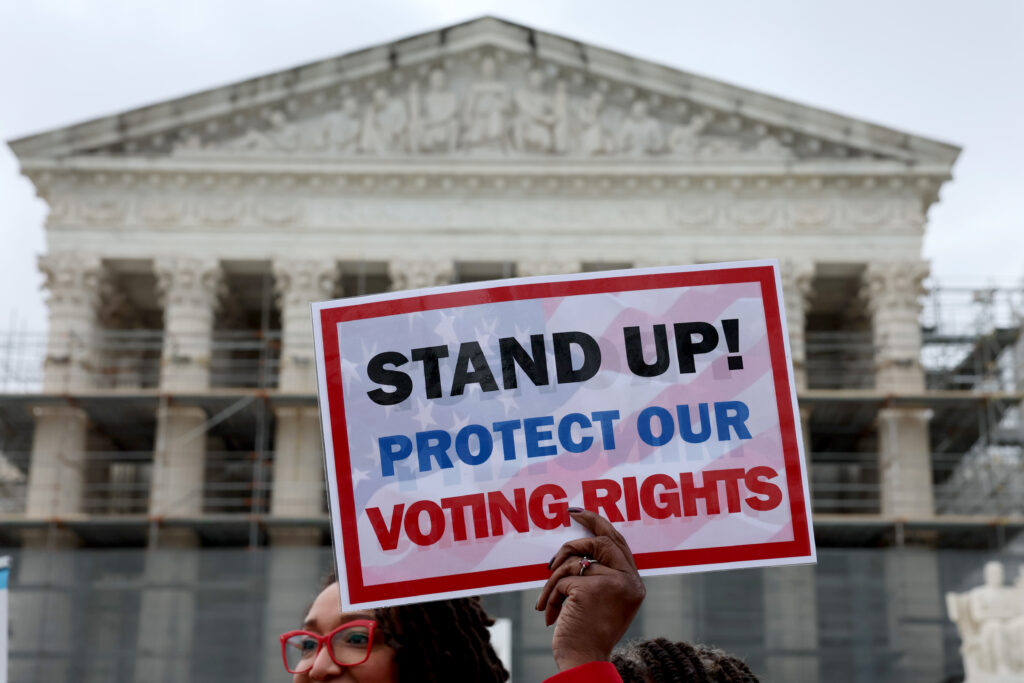SCOTUS May Let the GOP Gerrymander Black Southerners Out of Congress

With the midterms hurtling closer and the Republican majority at risk, Donald Trump is pressuring Republican state lawmakers to gerrymander congressional maps — eliminating districts that elect people of color and silencing Democratic voters.
And if recent Supreme Court decisions are any hint, our nation’s highest court won’t be stepping in to protect voters of color. In fact, it could take steps to further weaken protections against racial bias in the redistricting process.
Texas has been leading the charge on gerrymandering, with Gov. Greg Abbott (R) announcing a special session to redraw the state’s congressional districts.
To provide political cover, the U.S. Department of Justice (DOJ) sent a letter to Texas claiming that the current map impermissibly used race to draw districts, and urging the state to draw a new map. Abbott cited these concerns when announcing the special session.
And if recent Supreme Court decisions are any hint, our nation’s highest court won’t be stepping in to protect voters of color.
The DOJ cited a 2024 precedent from the far-right Fifth U.S. Circuit Court of Appeals which found that Texas violated the 14th Amendment’s equal protection guarantee by combining Latino and Black voters to create “coalition districts” that empower voters of color. But former DOJ official and election law expert Justin Levitt said the DOJ is misinterpreting the Fifth Circuit, noting that the court “did not rule on what constitutes an unconstitutional racial gerrymander — it just asserted that the VRA does not let individual racial or ethnic groups join together to claim that political boundaries dilute their votes.”
Even more telling, in defending its map against a lawsuit, Texas officials have consistently denied that they used race.
In other words, when faced with discrimination charges, Texas Republicans denied using racial data. Yet now, they’re using the DOJ’s allegations of racial targeting as justification for a mid-decade gerrymander.
Voters in the lawsuit have asked the federal court to reopen testimony to address the inconsistent claims. They argued that the “trial testimony of the relevant witnesses and this new evidence [from the DOJ] are flatly contradictory. One or the other is false.”
The Texas congressional map is already heavily gerrymandered. In a state that votes 55% Republican, the GOP controls 70% of the seats. The mid-cycle gerrymander would do even greater damage to voters of color and potentially cost Democrats five seats in the House.
The special session called by Abbott for redistricting was initially aimed at providing relief from Texas’ recent deadly floods.
“We will not allow this tragedy to be used as political cover for an extreme agenda that does nothing to help families get back on their feet,” State Representative Gene Wu (D) said.
Muddying the Waters of Equal Protection
Meanwhile, the U.S. Supreme Court looks unlikely to come to the rescue of voters of color.
In recent years, the court’s racial gerrymandering jurisprudence has taken a bad turn. Back in 2018, in a nearly unanimous ruling, the justices found that North Carolina lawmakers had gerrymandered Black voters, even though they denied using racial data.
The VRA, as interpreted by federal courts, requires lawmakers to avoid packing too many voters of color into certain districts, or “cracking” communities of color into multiple districts. Like the judges in the recent Texas case, the Court said that North Carolina Republicans couldn’t just ignore race and then claim the districts weren’t discriminatory.
But that was before the court’s current 6-3 far-right majority. Last year, the justices accepted South Carolina lawmakers’ claims that they gerrymandered districts in order to help Republicans — which the court has said is allowable — and not to discriminate against Black voters.
Now, the high court could be poised to go even further.
The justices agreed to hear an appeal last year from “non-Black voters” in Louisiana, who argued the state’s congressional map, which contains two majority-Black districts, discriminate against them in violation of the 14th Amendment.
The VRA could become all but useless for stopping racial discrimination in the redistricting process.
But instead of ruling on the case, the Justices asked for additional briefing and kicked the can down the road until their next session.
The delay has democracy advocates worried that the court could be planning to issue a broad ruling that further weakens the VRA.
If the justices agree with the non-Black voters that Louisiana violated the Constitution by drawing two majority-Black districts, the VRA could become all but useless for stopping racial discrimination in the redistricting process. That would mean Texas and other GOP-controlled states across the South could eliminate majority-minority districts, leaving state courts as the only recourse for gerrymandered voters.
The Court could also have a chance to rule on federal racial gerrymandering cases out of Florida and North Carolina, where trials recently concluded. And Alabama lawmakers are appealing to the justices to overturn a ruling by three GOP-appointed judges that the state intentionally discriminated against Black voters.
The high court already has empowered Trump’s power grab in several crucial ways in recent months. And now, with Republicans unleashing gerrymandering tactics in a desperate bid to protect their majority, it could be set to do so again — with minority voters paying the price.
Billy Corriher is the state courts manager for People’s Parity Project and a longtime advocate for fair courts and progressive judges. As a Democracy Docket contributor, Billy writes about voting and election state court cases in North Carolina and across the country.